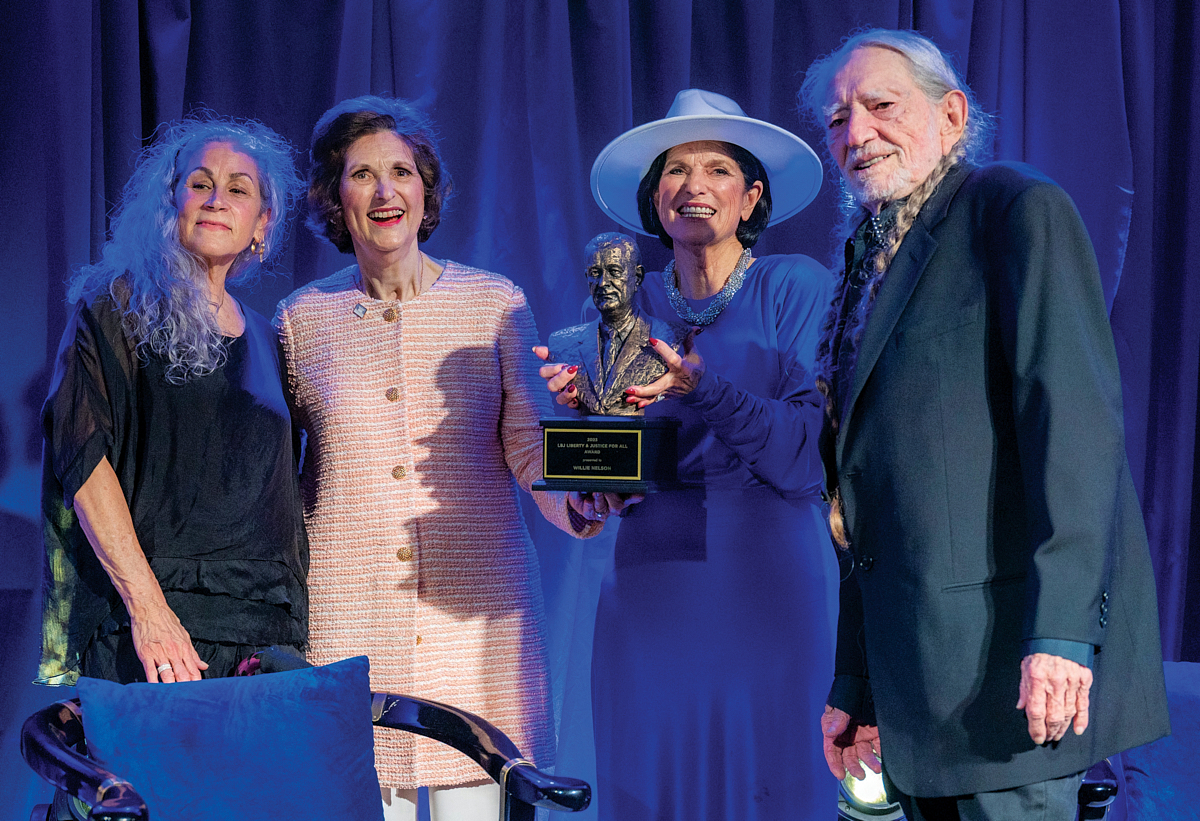LBJ School Unveils the Willie Nelson Endowment for Uplifting Rural Communities

This September will mark 38 years since music legends Willie Nelson, Neil Young, and John Mellencamp organized the first-ever Farm Aid concert to raise money to keep family farms in business. Nearly four decades later, Farm Aid has raised over $70 million for the cause. But Nelson, who turned 90 years old this year, wants to do even more for rural America. It’s a cause close to Nelson’s heart—he grew up in Abbott, Texas, a mostly rural area, and in high school, he joined the Future Farmers of America.
In the spring of 2023, UT’s LBJ School for Public Affairs announced the Willie Nelson Endowment for Uplifting Rural Communities, which will fund research around sustainable agriculture and water, resilient energy, and natural disaster recovery efforts to ease the burden of climate change on rural communities.
“There’s a whole host of problems that folks in rural America are having to survive,” says Raj Patel, a research professor in the LBJ School whose work focuses on food systems, ecology, and climate change. “And Willie’s been attuned to that for ages. The financial pressures on farmers aren’t going away.”
Patel pointed out that the industry currently faces several challenges that weren’t a concern when Nelson initially founded Farm Aid, one of them being the increasing age of farmers. According to the U.S. Department of Agriculture, the average age of farmers was 57.5 in 2017, a number that Patel says is only getting higher and higher. Patel is hopeful that research funded by this endowment could help.
“The joy of Willie is that he listens to farmers,” Patel says. “What I would hope is that we listen to problems that we could define with farmers collaboratively.”
Patel says this research could be furthered through collaboration with farming organizations, like the National Family Farm Coalition.
“They’ve got lots of questions around, not just ‘what crops might we grow in the future?’ but also all of the alternative economic arrangements we could imagine that would liberate rural communities from the often rather oppressive monopolies under which they operate,” Patel says.
Sheila Olmstead, also an LBJ School professor, says the endowment will be important to her work researching the environmental and economic impacts of water quality and water scarcity.
“Texas is a great place for this kind of work because the state, even though it’s true we have lots of big cities, it’s still very much a rural state, and I think these issues are really front and center and it touches everything, whether you’re talking about oil and gas development or renewables,” Olmstead says.
Olmstead says it’s fitting that the Nelson endowment is housed in the LBJ School, since President Lyndon B. Johnson’s work so closely aligned with the activist causes Nelson frequently supports, such as civil rights and environmentalism.
“You can draw this really careful line between Johnson’s legacy and the school and folks working on those issues,” Olmstead says. “And now we’re in an age where the changing climate touches everything, every policy issue you can think of. So it’s a great moment for us to really specialize and to improve on what we’ve already started to build, which is a really terrific faculty working on these issues that are so important and are just only going to be more so over the coming decades.”
Olmstead says in addition to supporting faculty research, the endowment will, of course, benefit students.
“We have all these people from the school going on to influential and important policy positions at all levels of government,” Olmstead says. “The more we can do to educate those students to attract the very best and the brightest, and to educate those students about how these environmental and rural issues really affect everybody, I think the better off the world will be.”
The endowment is made possible by the LBJ foundation, which honored Nelson with the LBJ Liberty & Justice for All Award, the foundation’s highest award, at a gala on May 12 at the LBJ Presidential Library.

Gala attendees, bedecked in stylish combinations of formalwear and Western wear, enjoyed dinner on the LBJ Library plaza before hearing from Nelson himself in conversation with Mark Updegrove, president and CEO of the LBJ Foundation.
Updegrove’s questions for Nelson focused around the singer’s rural Texas upbringing. It wouldn’t be a conversation with Nelson if it didn’t feature some of his signature jokes—at one point, Nelson quipped that the population of Abbott never changed, because “as soon as a baby was born, a man left town.” But Nelson got serious about rural farmers. When Updegrove asked about Nelson’s support for farmers, Nelson said:
“A lot of people don’t realize where their food comes from. When you had breakfast this morning, did your food come from a farmer out here … or did some trucker drive it in from 150 miles away? These are things you need to think about, and how you can help the local communities and help the local farmer, because he’s trying to make it.”
Nelson also shared advice for how to make an impact on the world.
“I believe in imagining what you want and then get out of the way,” Nelson said. “Imagine getting up every day and say[ing], ‘Here’s what I’d like to see happen today.’ And then get out of the way and let it happen. It’s worked for me.”
The proceeds from the gala, which featured performances from country legends (and friends of Nelson’s) such as Lyle Lovett and Elle King, all went toward the endowment.
As with all things Nelson’s involved with, the gala felt like a family gathering—and future Texas families, according to Patel, are who will benefit from this endowment the most.
“This is so important, particularly to the generations that haven’t had the chance to grow up on land or have family connected to land. For [many] young Texans, the chance to grow up on farmland and be connected to that is an increasingly remote possibility,” Patel says. “And this endowment opens the door to create a sort of work-study program that is essentially a generation of scholar-activists who are accountable to rural communities. So that one day, the hope would be that Farm Aid wouldn’t be needed anymore.”
CREDITS: Courtesy of James Minchin; LBJ Library/Jay Godwin





